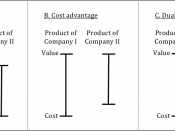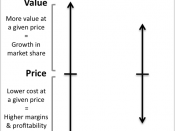Economics of Corporate Strategy
(1)
(i) Explain the following concepts:
(a) tacit knowledge
(b) idiosyncratic knowledge
(c) path dependence
(a) Tacit Knowledge
A tacit knowledge is something which is in mind of an individual. It is seen from different angles as knowledge that is limited to self as oppose to explicit knowledge which in views of Nonaka and Tekeuchi (1995) is "represented by artifact such as a document or a video which is created with the purpose of disseminating information to a wide spectrum of employees". The tacit knowledge eventually brings into light a firm's success and competitive advantage. The idea of tacit knowledge represents a modern day experience and a substantial contribution to human resources and capital that enhances competition. Companies that want to use tacit knowledge must be aware that it should not be left with specific individual in that the tendency of accumulating knowledge will be at risk because there is a chance that individuals may establish knowledge protectionism to the disadvantage of the company.
(b) Idiosyncratic Knowledge
The idiosyncratic knowledge is explained as variability among goal areas. The outline of idiosyncratic knowledge is one in which a firm's accomplishment level in one goal area on a test varies by more than expected from the accomplishment level that the firm displays on the test as a whole. Because accomplishment levels cannot be observed directly, there is need to observe accomplishment level estimates from goad areas within the example test. The process is also helpful in comparing these observations to the overall accomplishment level. It is clear that the current adaptive testing methods do not seem optimized to recognize idiosyncratic knowledge patterns, if they exist.
(c) Path Dependence
Skills, know-how, and general competencies are path dependent, meaning that they must be built, and cannot be just acquired. Strategic...


